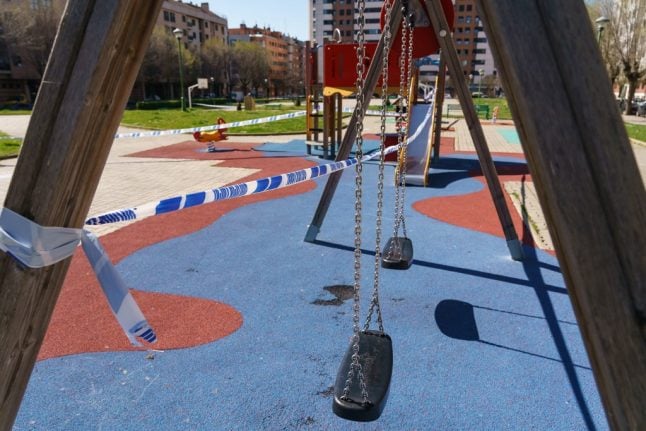After five weeks kept inside it was with great relief that parents welcomed the announcement on Saturday that from April 27th, Spain’s lockdown restrictions would be loosened to allow children to go outside.
Prime Minister Pedro Sanchez announced the measure with a view to softening the blow that general confinement would be extended by another two weeks until May 10th.
Initially the conditions under which children would be allowed to leave the house were left vague, but more details were announced following a cabinet meeting on Tuesday.
And then after much criticism from the public, the government offered more concessions to parents.
LATEST: Spain's government confirms new rules for taking children outside during lockdown
Here’s what we know so far.
When?
Initially we were told from Monday April 27th, children under the age of 14 will be allowed to leave their homes, where they have been confined since March 14th when a state of alert was declared.
But in a later press conference on Tuesday, Health Minister Salvador Illa seemed to suggest the new measures would be in place as soon as the weekend.
Who with?
The announcement stated that children must be accompanied by a parent or guardian when they leave the house. It must only be in the company of an adult that lives within the same household as the child.
So far under the lockdown rules, a parent could only take a child on an errand with them if there was no other adult at home to care for them and they were too young to be left alone.
Maria Jesus Montero, the government spokesperson who announced the details of the new measure warned children must follow hygiene rules outside the home that is, keep a distance of two metres from other people, be careful not to touch surfaces etc, and should not leave the house if showing symptoms of the virus.
“It is the accompanying adult’s responsibility to ensure that these hygiene measures adhered to,” she said.
Will they be allowed to play outside?

The initial statement made it clear that children are not being allowed out “to play”, but rather to accompany their parents on those valid trips outside the home that are permissible under lockdown restrictions. That means, on a trip to the supermarket or pharmacy or on a visit to the ATM or bank.
They will not be allowed to visit children’s playgrounds or go to the park or beach as contact with other children is to be avoided at all costs. Initially taking children for a simple walk around the block was still banned under the guidelines.
But then parents in Spain reacted with anger describing the relaxation as “a half measure”. One reader of The Local described it as a complete joke.
There were renewed calls to let children outside to play. Across Madrid people banged pots and pans from their balconies in the usual show of protest.
The government backed down.
“This is a government that listens and next weekend I will issue an order allowing children under 14 to take walks from Sunday April 26th,” said Health Minister Salvador Illa.
So how long can they go outside for and for what activities?
We have yet to be told the details following the government's U-turn and decision to allow children out for walks. The conditions “would be announced soon,” insisted Illa who went on to call for the public “to allow us to finish the details” of the plan, including “maximum time, distance and safety.”
Why only under 14 year olds?
The reasoning for the age limit was explained by Maria Jesus Montero, government spokesperson, after the cabinet meeting.
“Those aged between 14 and 18 are allowed to be left alone and they could already carry out activites such as going to the shop to buy bread or a newspaper and will continue to be able to do so alone. A four-year-old however cannot go out alone in the street.”
What do parents think about it?

The lifting of restrictions was keenly anticipated by the parents of the roughly 6.8 million children under 14 in Spain but some parents consulted by The Local immediately expressed frustration at the “half-measures” which prevent children from running around in the open air to expend energy.
“It’s a complete joke, It’s incredibly disappointing, we live out in the middle of nowhere we could easily go out for a walk without being seen by anyone but we have been purposely following the rules and holding on in anticipation of this,” said Tania Garcia, a mother of a four-year-old boy, who lives near A Coruña, Galicia.
READ MORE:



 Please whitelist us to continue reading.
Please whitelist us to continue reading.
Member comments